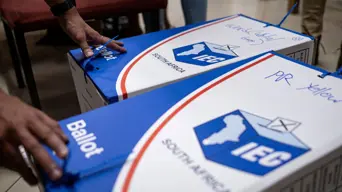Honorary consulates have no state power & can't conduct elections - IEC lawyers
On Tuesday, the Electoral Court heard the DA’s application against the IEC to have voting stations at all consulates.

FILE: An electoral commission official verifies sealed ballot boxes at the Fordsburg Primary School polling station under the supervision of party delegates in Johannesburg on 1 November 2021. Picture: Emmanuel Croset/AFP
JOHANNESBURG - Lawyers for the Electoral Commission of South Africa (IEC) have argued that honorary consulates, where the Democratic Alliance (DA) would like voting abroad to happen, have no state power and therefore cannot conduct an election.
On Tuesday, the Electoral Court heard the DA’s application against the IEC to have voting stations at all consulates.
While the IEC has set up voting stations at only certain consulates, the DA has argued that this is against electoral law.
The DA has argued that Section 33 of the Electoral Act includes all embassies, high commissions and consulates and so South Africans abroad should be able to cast their vote at any of these.
But counsel for the IEC, advocate Geoff Budlender, has argued that by definition and by law, honorary consulates cannot conduct elections.
"A consulate is an administrator and facilitator… but it does not exercise state power."
The DA’s lawyers have argued that the IEC refuses to try and accommodate South Africans abroad, who have to travel long distances to cast their ballot.
They have asked the court to rule that the IEC must do all that is necessary to set up polling stations at all consulates.